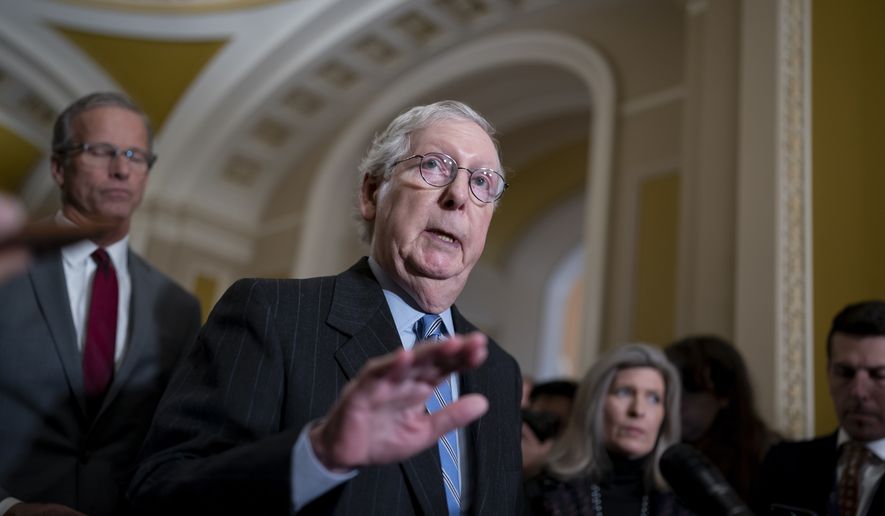Top Senate Republicans on Tuesday called for a short-term spending bill to keep open the government into January, saying time is running out to pass a full federal budget before the holidays and the end of the current Congress.
Current government funding expires at midnight Dec. 16, and negotiations with Democrats have yet to yield a long-range deal.
“I think it’s becoming increasingly likely that we may need to do a short-term [spending resolution] into early next year,” said Senate Minority Leader Mitch McConnell, referring to a temporary spending measure called a continuing resolution. “We’re running out of time, and that may end up being the only option left that we could agree to pursue. … I’m dealing with the practical situation.”
Kicking the can to the new Congress to approve a full budget, known as an omnibus, would have major implications. House Republicans will control the purse strings in January, setting up a partisan spending battle with Senate Democrats in a process that has already been contentious.
The Kentucky Republican’s remarks align with House Minority Leader Kevin McCarthy, who has said he will only agree to a budget in the new year when Republicans will have more leverage. Mr. McCarthy has echoed calls from conservatives that spending needs to be slashed, as the California Republican tries to lock down enough support among his right flank to be elected the next speaker of the House.
Senate Majority Leader Charles E. Schumer said there were no plans by Democrats to drop their pursuit of a full budget.
SEE ALSO: McConnell joins Dems in bashing push to include Manchin energy deal in defense policy bill
“This isn’t an easy process, but it’s important, nonetheless,” the New York Democrat said. “For the well-being of our troops, for the preservation of our national security, for the tens of millions of Americans who look to the federal government for a wide range of basic services, Democrats and Republicans must work together to fully fund the federal government.”
Although Democrats control both chambers, they need 60 votes in the Senate to clear a filibuster and agreement from all 100 senators to move any piece of legislation in a timely fashion and avoid running out the procedural clock.
The federal government has been operating on a stopgap funding measure since the beginning of the fiscal year that began Oct. 1. Congressional negotiators have been unable to agree on topline spending figures that impact a host of other provisions in the legislation, which is typically around $1.5 trillion.
Republicans have blamed Democrats, arguing that they waited too long to begin talks and want too much spending, despite allocating hundreds of billions of dollars toward their priorities just this summer in a major tax-and-climate-spending law.
“The Democrats want to play games to increase the amount of non-defense discretionary spending,” said Senate Minority Whip John Thune, South Dakota Republican.
Mr. McConnell charged Democrats with wasting precious time and political bandwidth on trying to ram through controversial and unrelated measures in the must-pass annual National Defense Authorization Act (NDAA) that sets defense policy.
“[Democrats are] screwing up the NDAA by trying to drop a lot of unrelated things on it, and on an omnibus, we don’t even have an overall agreement on how much we’re going to spend,” he said. “There’s only so much you can do with the time that’s left.”
• Ramsey Touchberry can be reached at rtouchberry@washingtontimes.com.




Please read our comment policy before commenting.